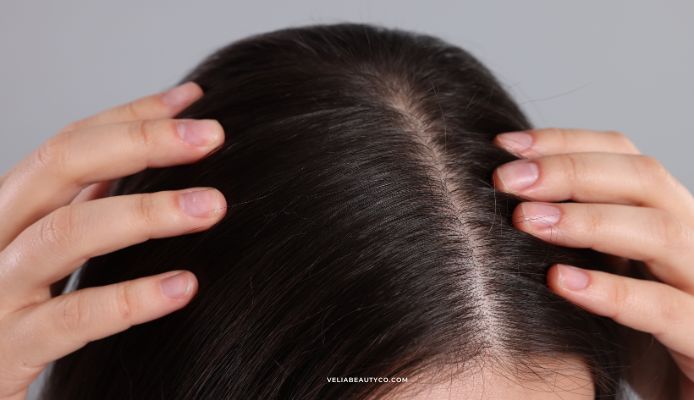
Don’t Feed The Fungus: Debunking Hair Myths and Why You Should Rethink Oiling and Scalp Care
Share
2 | Don’t Feed The Fungus: Debunking Hair Myths and Why You Should Rethink Oiling and Scalp Care
Welcome back to the Beauty Lab Podcast, your drive-time resource for all things beauty, health, and wellness! In today’s episode, we’re diving into the buzzworthy trends of oiling your scalp and hair, basic scalp care, and the difference between dry scalp and dandruff. With over 40 years of combined experience, your hosts, Monina and Velia, are here to break down the facts, bust the myths, and share expert advice.
1. Should You Oil Your Scalp?
Let’s address the big question: is oiling your scalp beneficial? Contrary to popular belief, oiling your scalp does not help hair growth. Here’s why:
- Sebum Sufficiency: Your scalp naturally produces oil (sebum), so adding extra oils can disrupt its balance.
- Clogged Follicles: Oils like coconut oil are highly comedogenic (rated 5 out of 5) and can clog pores, potentially halting hair growth over time.
- Feeding Fungus: Over-oiling can worsen scalp conditions like dandruff by "feeding" the naturally occurring Malassezia fungus.
Takeaway: Avoid leaving oils on your scalp. If you must, wash them off immediately.
2. Oiling Hair Ends: When It’s Helpful
Oiling the ends of your hair can protect against dryness, especially if you wash your hair frequently. Here’s what to keep in mind:
- Choose Wisely: Opt for lighter oils like grapeseed, argan, or hemp seed oil, which are less likely to clog pores.
- Avoid Overuse: Coconut oil is hard to wash out and can leavea residue that irritates your scalp and skin.
Pro Tip: Try a pre-mixed shine serum like Velia’s Liquid Amethyst for a non-greasy finish.
3. Scalp Care 101: How Often Should You Wash?
When it comes to scalp care, balance is key.
- Wash When Dirty: Rub your scalp—if it feels greasy, it’s time to wash. For most people, this means 2-3 times a week.
- Sweaty Situations: If you work out daily or are exposed to sweat or grime, wash more frequently.
- Double Shampoo: Always shampoo twice. The first wash removes buildup; the second cleans the scalp thoroughly.
Avoid Overwashing: Washing every day can strip natural oils, leading to a dry scalp.
4. Dry Shampoo: Use Sparingly
Dry shampoo can be a lifesaver for extending your style, but it’s not a replacement for washing.
- Don’t Overuse: Use dry shampoo no more than once between washes.
- Apply Properly: Hold the can 12 inches away from your scalp and apply sparingly.
- Pick the Right Type: Velia recommends Cheat Day dry shampoo, which absorbs oil without leaving residue.
5. Dry Scalp vs. Dandruff: What’s the Difference?
Understanding the root cause of flakes can help you treat them effectively.
- Dry Scalp: Caused by weather, dehydration, or environmental changes. Small, powdery flakes with occasional itchiness.
- Dandruff: A result of seborrheic dermatitis, caused by the Malassezia fungus reacting to excess oil. Flakes are larger and sticky.
Solutions:
- For dry scalp: Hydration, omega-3 fatty acids, and a gentle scalp scrub like Velia’s Himalayan Salt-based formula.
- For dandruff: Address internal factors like diet, stress, and hormone balance.
6. Listener Question: 10-Minute Scalp Care Routine
Stephanie P. from Austin asked for a quick shower routine. Here’s Velia’s expert advice:
- Brush First: Detangle hair and brush your scalp to loosen buildup.
- Double Shampoo: Lather for 60 seconds during the first wash to remove buildup, then repeat.
- Condition Strategically: Apply conditioner only to the lengths and ends of your hair and rinse thoroughly.
